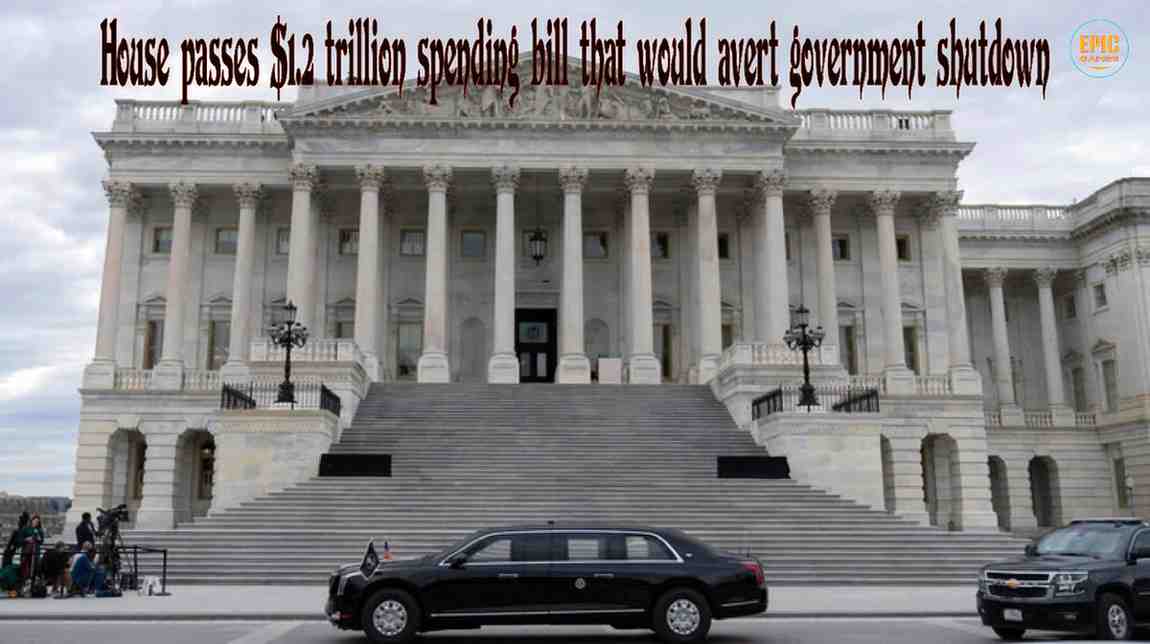A 286-to-134 bipartisan vote to endorse a $1.2 trillion spending bundle sent the action to the Senate on Friday, hours on time to deflect a halfway government closure. The bill would subsidize around 3/4 of the public authority for the following a half year and has the help of President Biden and heads of the two players in Congress.
The House passed a huge spending bundle on Friday to completely finance the public authority through September, sending it to the Senate in front of a 12 PM cutoff time to deflect a halfway closure.
The House endorsed the $1.2 trillion bundle, which was disclosed early Thursday, in a vote of 286 to 134. The bundle wraps six spending bills into one to support around 3/4 of the public authority for the rest of the financial year. Another bundle subsidizing the remainder of the public authority cleared Congress fourteen days prior.
A larger part of conservatives casted a ballot against the action, with House moderates protesting the financing levels in the understanding that House Speaker Mike Johnson came to with Popularity based administration in the Senate. The bill incorporates cash for the divisions of State, Country Security, Guard, Work and Wellbeing and Human Administrations, as well as assets for unfamiliar activities, monetary administrations and the regulative branch.
The excited race to finance the public authority was the most recent illustration of inward divisions inside the inexorably restricted conservative greater part that hosts constrained gathering pioneers to depend on Fair votes to get regulation passed, likely arousing a lot of disappointment for preservationists. Leftists decided in favor of Friday’s bill by an edge of 185 in favor to 22 against, contrasted with the 101 to 112 split among conservatives.
Rep. Marjorie Taylor Greene, a Georgia conservative, prodded a potential no-certainty vote in Johnson, documenting a movement to clear that the House could be compelled to consider after its forthcoming fourteen day break. The movement is the very move that a modest bunch of conservatives used to remove Rep. Kevin McCarthy of California from the speakership in October in the midst of GOP divisions about how to deal with spending.
“I filed the motion to vacate today, but it’s more of a warning,” Greene said after the House vote, adding that “it’s time for our conference to choose a new speaker.”

The spending deal
Passage in the House moves Congress one step closer to ending a fight over spending that has persisted six months into the fiscal year, one that has forced lawmakers to repeatedly rely on short-term funding extensions to keep the government operating since October.
Johnson, a Louisiana Republican, waived a self-imposed 72-hour rule that gives lawmakers time to read legislation before a vote in order to get it across the finish line and send it to the Senate, giving the upper chamber just hours before the clock strikes midnight.
Senate decides that permit a solitary legislator to protest speeding up a bill’s entry could drive a vote into Saturday. Conservatives are likewise prone to request votes on revisions in return for accelerating the cycle, as they did with the last subsidizing bill. Sen. Susan Collins of Maine, the top conservative on the Senate Appointments Advisory group, anticipated the upper chamber could hold revision votes when Friday evening.
A short pass in financing over the course of the end of the week may not cause disturbances. At the point when President Biden marked the main financing bundle hours after a comparable closure cutoff time recently, the Workplace of The board and Spending plan said organizations wouldn’t close down and could proceed with their typical tasks, since obviously a goal was inescapable.
After delays brought about by disagreements regarding financing for the Branch of Country Security, the House and Senate Allocations Boards of trustees delivered the second bundle in the early morning long periods of Thursday.
Conservatives and leftists both guaranteed triumphs in the bundle.
Liberals promoted subsidizing for youngster care and schooling programs, clinical exploration, emotional wellness care and an augmentation of the President’s Crisis Plan for Helps Alleviation, a drive known as PEPFAR that is credited with saving 25 million lives around the world.
“We needed to work inside troublesome monetary imperatives — yet this bipartisan trade off will keep our nation pushing ahead,” Sen. Patty Murray of Washington, the top Vote based appropriator in the Senate, said in a proclamation.
Conservatives featured financing for Line Watch specialists and more detainment beds, as well as a restriction on subsidizing for the Unified Countries Help and Works Organization for Palestine Outcasts, the really philanthropic office working in Gaza, through Walk 2025.
